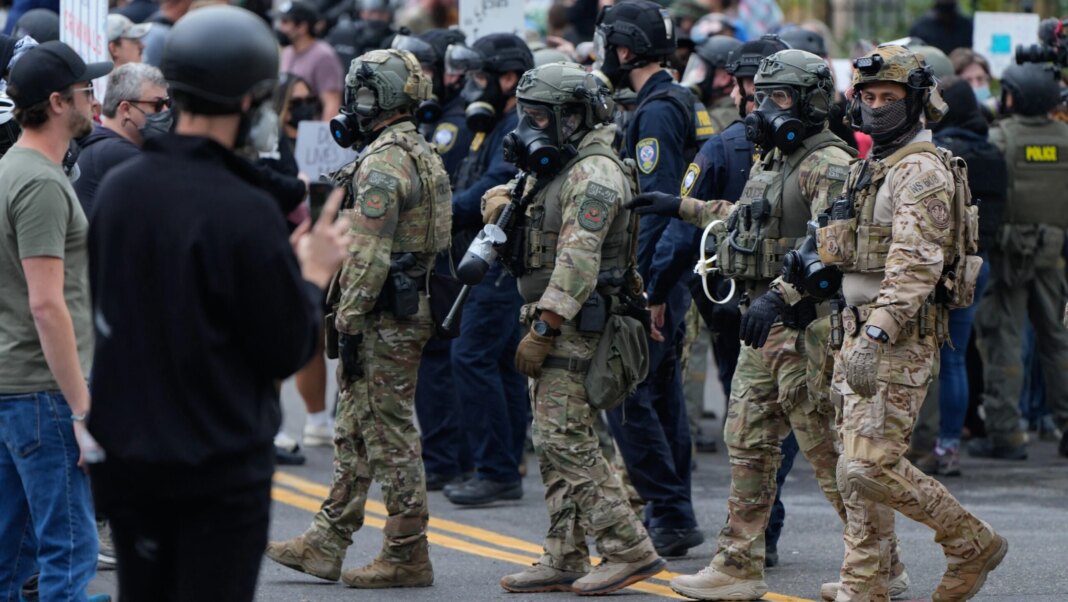Deployment of National Guard Troops: A Political Controversy in Oregon and California
In a significant move that has drawn sharp criticism and legal challenges, President Donald Trump has initiated the redeployment of approximately 200 members of the California National Guard to Oregon. This decision comes after a federal judge temporarily blocked the deployment of Oregon’s own National Guard units to Portland, prompting both California and Oregon’s governors to push back against the administration’s actions.
The Pentagon confirmed the reassignment, indicating that troops previously stationed in Los Angeles were now en route to Portland. Oregon Governor Tina Kotek announced that around 100 troops had already arrived, with an additional 100 on the way. However, both Kotek and California Governor Gavin Newsom expressed serious concerns about the deployment, citing a lack of formal communication and warning against what they perceive as a misuse of military power.
Legal Challenges and State Responses
The legal ramifications of this move are significant. Oregon’s Attorney General, Dan Rayfield, announced that the state would be pursuing an amended temporary restraining order to block the deployment of any National Guard troops, labeling the situation as unlawful. “What was unlawful yesterday is unlawful today,” Rayfield stated, drawing attention to the court ruling that aimed to protect Oregon’s sovereignty and prevent the military’s involvement in what they argue is a local issue.
Governor Kotek went further, emphasizing her administration’s commitment to resisting what she characterized as federal overreach. During a news conference, she remarked that “there’s no need for military intervention in Oregon,” calling into question the rationale behind deploying troops to a state she insists is not experiencing any insurrection or national security threats.
California Joins the Fight
California is not only affected by the deployment but is also actively participating in the legal contest against the federal government. Governor Newsom condemned the deployment, framing it as “a breathtaking abuse of law and power.” He highlighted that these troops were initially federalized in response to unrest in Los Angeles and suggested that there are no legal grounds to reassign them to a different mission in Oregon.
California’s involvement extends to supporting Oregon’s lawsuit challenging the deployment, arguing that the federalization of the troops should not allow the president to alter their mission arbitrarily. “They cannot continue to hold the federalized National Guard members hostage,” the lawsuit states, emphasizing that their intended use must conform to strict legal limitations.
Military Presence Amidst Protests
The backdrop to this military mobilization is a series of protests centered around the U.S. Immigration and Customs Enforcement (ICE) building in Portland. While these demonstrations have occurred regularly, they have largely been confined to a small area, contradicting Trump’s characterization of Portland as “war-ravaged.” U.S. District Judge Karin Immergut, appointed during Trump’s first term, emphasized that the protests did not justify the militarization of local law enforcement and that such actions could infringe upon the state’s autonomy.
Political Context: The Broader Picture
This episode is part of a larger strategy, as Trump has vocalized plans to send troops to multiple cities, including Chicago, which faced a similar military deployment this past weekend. Illinois Governor JB Pritzker has also voiced his opposition to deploying the National Guard in his state, echoing concerns that the military presence isn’t warranted given the current circumstances. Such sentiments underscore the contentious political landscape surrounding law enforcement and military intervention in urban communities.
Amidst these developments, California Attorney General Rob Bonta pointed out the administration’s trend of targeting cities led by Democratic officials, further polarizing opinions on the necessity and appropriateness of military force in civilian areas. “It’s our National Guard, not Trump’s Royal Guard,” Bonta remarked, positioning California’s troops as a resource meant to serve and protect citizens rather than to quash dissent or opposition.
Concerns Over Civil Rights
The discussions around military intervention also raise significant civil rights concerns. Portland Mayor Keith Wilson expressed alarm over what he described as “unjustified use of force” by federal agents during protests. He stated that such aggressive tactics risk inflaming a situation that has otherwise remained relatively peaceful, pointing to the need for a more measured approach to handling civil unrest.
As the situation evolves, local authorities and state leaders remain vigilant, alerting the Department of Justice to potential civil rights violations arising from the federal response to protests. The tension between federal authority and state sovereignty is set to spark further legal battles as both Oregon and California prepare to challenge the president’s decisions in court.
A National Dialogue on Law Enforcement
This situation encapsulates a broader national dialogue about the role of law enforcement and military in civilian governance. The deployment of National Guard troops into urban areas exemplifies the ongoing struggle between federal oversight and local governance, raising essential questions about the legality, morality, and implications of such military actions during periods of civil unrest.



